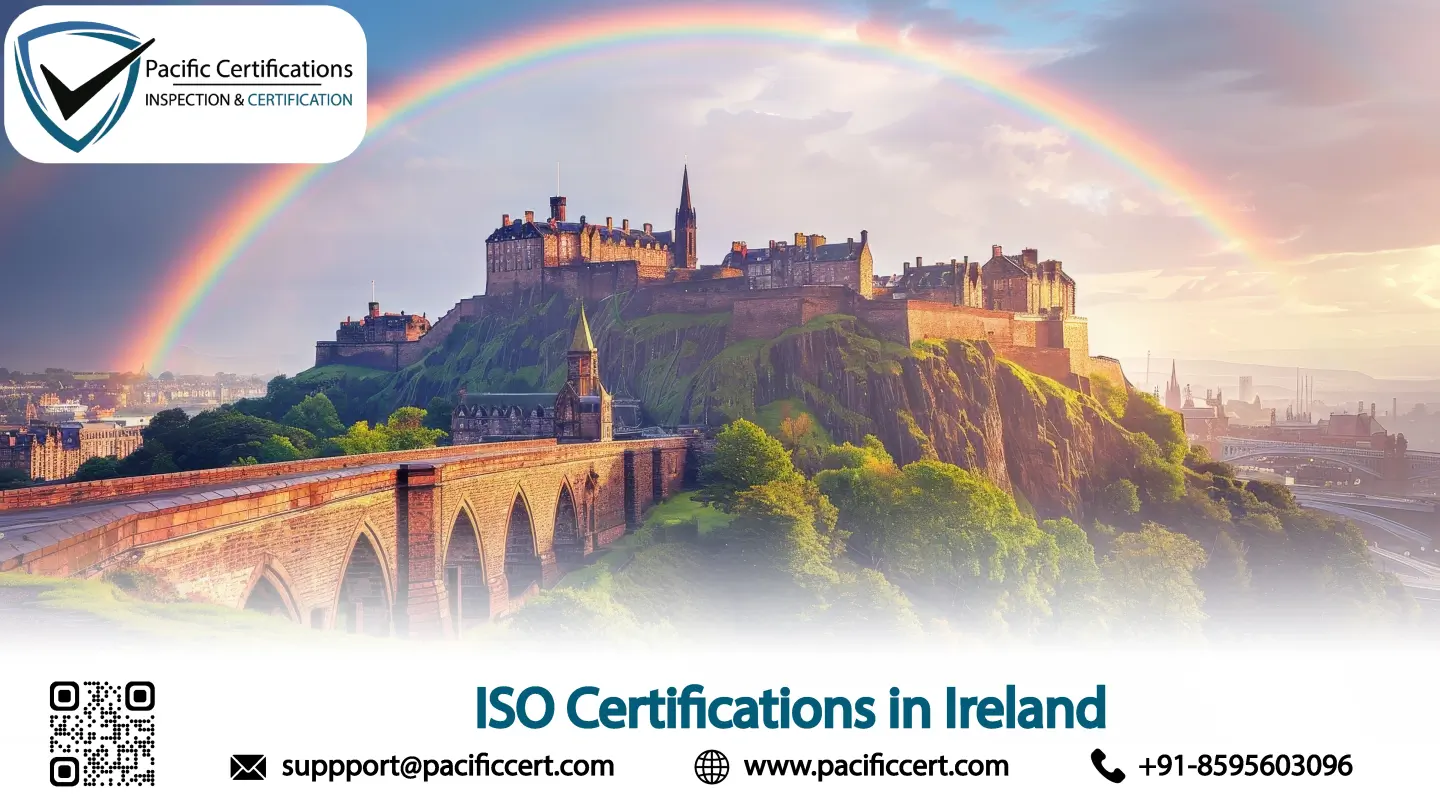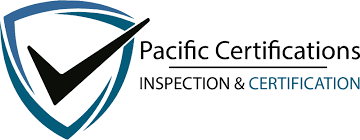ISO Certifications in Ireland - Popular Standards, Requirements and Benefits

Introduction
Ireland’s economy blends high-value manufacturing (pharma, med-tech, chemicals), precision engineering and construction, agrifood and beverages, logistics through Dublin, Cork and Shannon, healthcare and laboratories and a powerful digital sector spanning cloud, data centres, payments and cyber in Dublin and the South-West. By adopting standards such as ISO 9001 (Quality Management), ISO 14001 (Environmental Management) and ISO 45001 (Occupational Health & Safety), Irish companies can cut waste, improve yield and win trust from buyers and regulators. For fast-growing areas like ICT, construction and agrifood, ISO certification is a practical step to attract international clients and compete with confidence. These programs give auditable proof on quality, safety, environment, information security and continuity that buyers and lenders accept across the EU and worldwide.
Contact Pacific Certifications to start your ISO application in Ireland, we’ll confirm scope and propose Stage-1/Stage-2 audit dates under recognized accreditation.
Economic Context & Industry Overview
Ireland is a diversified, export-oriented economy. Pharma and med-tech anchor goods exports; construction and infrastructure are active across rail, housing and ports; dairy and beverages supply EU and global markets; and the digital economy keeps scaling with cloud platforms, data centres and fintech. Buyers, regulators and funders increasingly expect auditable management systems for supplier approval, tender participation and due diligence—making ISO a common language across plants, sites and digital operations.
Why ISO certification matter in Ireland?
Tier-one buyers and public bodies ask for evidence-based systems with clear records. ISO shortens vendor approval, stabilizes quality on precision lines, reduces incidents on sites, supports emissions and energy programs and protects data and uptime for banks, telecoms and cloud platforms. For food and beverage, HACCP-based proof is vital for retailer acceptance. Certification also organizes day-to-day evidence, policies, KPIs, competence, risk files and corrective actions, so reviews by customers, regulators and lenders move faster.
Popular ISO Standards in Ireland
Industry focus | Commonly requested standards | Why they matter |
Pharma, med-tech, chemicals | ISO 9001, ISO 14001, ISO 45001, ISO 50001 | Process control, emissions/waste, safer operations, energy performance |
Construction & infrastructure | ISO 9001, ISO 14001, ISO 45001 | Quality of works, environmental safeguards, site safety |
Agrifood, cold chain, beverages | ISO 22000, FSSC 22000, ISO 9001 | HACCP discipline, traceability, retailer/border acceptance |
ICT, cloud, data centres, fintech | ISO/IEC 27001, ISO 22301, ISO/IEC 20000-1, ISO/IEC 27701 | Security, continuity, IT service quality, privacy governance |
Logistics, warehousing, ports | ISO 9001, ISO 14001, ISO 45001, ISO 28000 | Turnaround, safe handling, environmental care, chain security |
Healthcare, labs & diagnostics | ISO 9001, ISO 15189, ISO/IEC 17025 | Patient trust, valid methods, competence |
Utilities & energy | ISO 9001, ISO 14001, ISO 45001, ISO 50001, ISO 22301 | Service reliability, EHS performance, energy and continuity |
Certification Process in Ireland
Preparation starts with an honest view of how work runs today and how evidence is captured. The aim is to make your system auditable without reinventing daily routines. Below are the steps to consider:
- List products services sites headcount and high-risk processes for clear scope
- Map processes end to end to show handoffs records and responsibilities
- Set policy and measurable objectives linked to customer and legal needs
- Assemble evidence packs for production maintenance labs IT and logistics
- Train process owners keep competence matrices and attendance records current
- Calibrate instruments verify methods and file certificates for quick checks
- Run internal audits that sample high-risk tasks and supplier interfaces
- Hold management review with KPIs audit results complaints legal updates and actions
- Schedule Stage 1 for readiness and Stage 2 for implementation verification align multi-site sampling to risk
- Blend on-site checks with remote interviews where suitable to reduce travel time
- Keep permits licenses and regulatory reports organized for quick verification
What are the requirements of ISO Certifications in Ireland?
Build the system around real work on lines, sites, clinics, warehouses and data rooms and align with Irish/EU rules so evidence stands up in audits, inspections and buyer reviews; below are the key requirements:

- Scope that matches products/services, processes and sites (single or multi-site).
- A documented system with controlled procedures and records that reflect practice.
- Risk assessment with controls for real hazards (HACCP, site safety, environmental aspects, privacy/security, energy) and change management.
- Competence matrices and training records for process owners and high-risk roles.
- Internal audits with reports, nonconformities, root-cause actions and verified closures.
- Management review with inputs (KPIs, audits, incidents/complaints, legal updates) and tracked decisions.
- Standard-specific artefacts: HACCP & CCP logs (ISO 22000), Statement of Applicability and risk files (ISO/IEC 27001), HIRA & PTW (ISO 45001), aspect-impact registers and objectives (ISO 14001), energy review & EPIs (ISO 50001).
- Legal/other requirements register with permits, inspections, calibrations, monitoring data and supplier compliance evidence.
Tip:Map controls to EPA permits/monitoring, Health and Safety Authority duties, food law for exports and GDPR/APPI-style privacy under the DPC.
What are the benefits of ISO Certifications in Ireland?
Use certification to improve tender win rates, reassure lenders/investors and keep performance steady across shifts and sites; below are the key benefits:

- Faster prequalification in buyer portals and public procurement
- Fewer incidents, defects and unplanned stoppages on sites and plants
- Clear roles and competence development for critical operations and maintenance
- Traceable data for warranty, claims, ESG and due diligence
- Stronger supplier control through audits, KPIs and corrective actions
- Measurable gains in energy use, waste, emissions, uptime and yield
- Stronger brand signals across the EU, UK and global markets
Market Trends
Energy transition and grid readiness. Government policy and system-operator plans target 80% renewable electricity by 2030, pushing utilities and large users to formalize ISO 50001 programs for energy performance and pair them with ISO 22301 to manage grid events, storage roll-out and operational change. EirGrid’s roadmap and national policy references confirm the 80% RES-E goal and the need to strengthen the network to carry it. (source: eirgrid.ie) Offshore wind scale-up. Ireland remains committed to 5 GW of offshore wind in construction by 2030 with ambitions beyond 2030; this raises audit expectations on safety, environment and supply-chain security across ports, fabricators and transmission partners, driving ISO 9001/14001/45001/28000 adoption.
The NIS2 Directive expands obligations for essential and important entities; Ireland’s NCSC notes that transposition is in progress and NIS1 remains in effect. Expect more buyers to ask for ISO/IEC 27001, ISO 22301 and ISO/IEC 20000-1 to evidence security, continuity and service quality for SLAs across cloud, payments and public platforms. (source: ncsc.gov.ie)
Challenges Faced in Ireland
Operational, regulatory and evidence-readiness issues related to getting certified can cause delays—budget limits and staffing gaps, incomplete or outdated documentation and records, weak internal audits and corrective actions, supplier-control gaps, multi-site sampling and travel logistics, calibration and permit backlogs and data/privacy mapping for ICT; below are the key challenges:
- Budgeting for certification time and ongoing system maintenance
- Viewing ISO as “compliance” rather than a performance tool in some teams
- Shortage of seasoned internal auditors and process owners outside large hubs
- Stalling on document control, internal audits and corrective-action discipline
- Multi-site and supplier sampling (e.g., farm-to-port or plant-to-DC chains) complicating logistics and evidence quality
What is the cost of certification in Ireland?
Budgets are confirmed after scoping and reflect headcount and risk, the number and spread of sites (e.g., Dublin, Cork, Limerick/Shannon, Galway), your chosen standards (single vs. integrated such as 9001+14001+45001), sector sampling depth (labs/cleanrooms, process plants, cold chains vs. offices) and travel/logistics. Your proposal itemizes Stage 1, Stage 2 and surveillance days, clarifies on-site versus remote activities and highlights any multi-site efficiencies so budgets remain transparent and predictable.
For personalized quote, contact [email protected]
What is the timeline for certification in Ireland?
Timelines depend on document and record readiness, the speed of closing any Stage-1 findings, whether you are single- or multi-site and whether your program is single-standard or integrated. Coordinating audit windows around shutdowns, release cycles, harvests or peak seasons—and auditor travel to regional sites—also affects duration. A well-prepared single site can progress from application to decision within one audit cycle; multi-site or integrated programs typically require additional planning and sampling time.
How Pacific Certifications can help?
Pacific Certifications audits and certifies ISO management systems for pharma and med-tech, chemicals and process plants, construction and materials, agrifood and beverages, logistics and ports, healthcare and labs and ICT/cloud across Ireland. We work under recognized accreditation with transparent pricing and an experienced local team that understands site realities and buyer expectations. Our certificates are accepted by procurement portals and international customers and we are recognized by ABIS.
Request your ISO audit plan and fee estimate. We will help you map Stage 1 and Stage 2 timelines and evidence requirements for your organization. Contact us at [email protected] or visit www.pacificcert.com.
Accredited Training Programs
Pacific Certifications provides accredited training programs in Ireland for ISO 9001, ISO 14001, ISO 45001, ISO 22000/FSSC 22000, ISO/IEC 27001, ISO 22301 and ISO/IEC 20000-1.
· Lead Auditor Training: for professionals auditing these systems across Irish industries.
· Lead Implementer Training: for personnel establishing or improving systems in plants, sites, cold chains, hospitals, utilities and ICT platforms.
These programs are conducted online or onsite, depending on client needs under ISO/IEC 17024 for personnel certification.
To begin the process or request a quotation, contact us at [email protected] or visit www.pacificcert.com.
Our team will guide you through the audit and certification process and planning stages specific to your operations in Ireland.
Ready to get ISO certified?
Contact Pacific Certifications to begin your certification journey today!
Suggested Certifications –
Read more: Pacific Blogs

